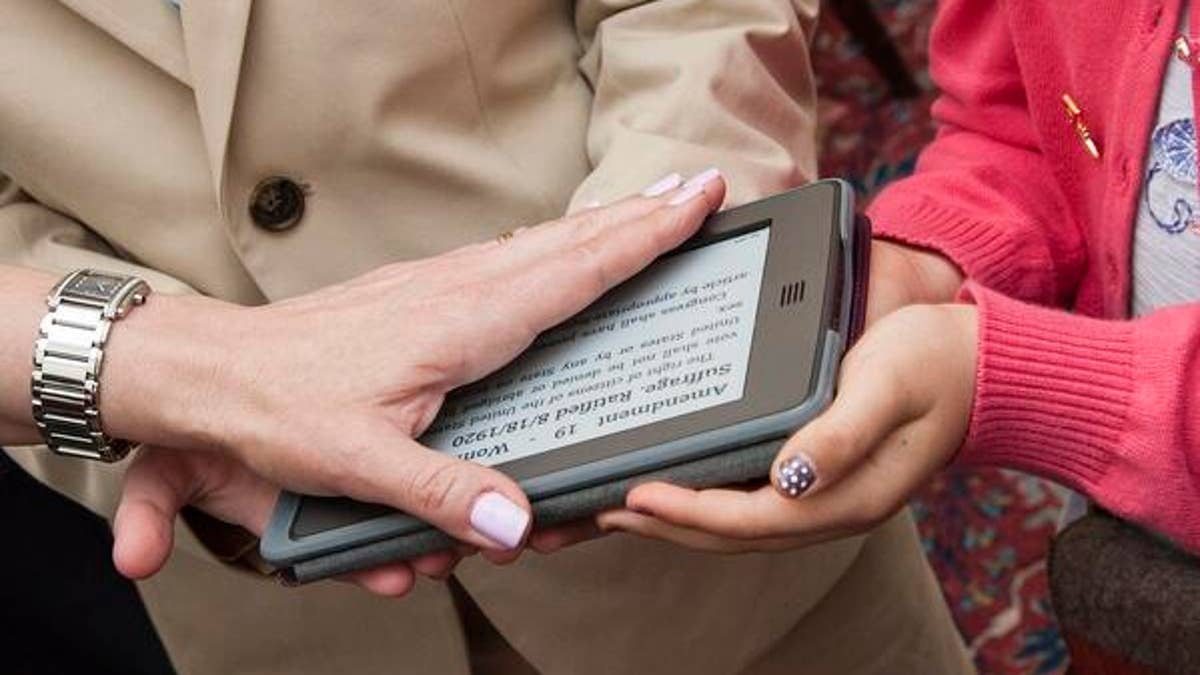
Suzi LeVine became the first U.S. ambassador to take an oath on an e-reader. (U.S. Embassy London Twitter)
It was called the wave of the future – the recently tapped U.S. ambassador to Switzerland was sworn in last month with her hand not on a paper Bible but on top of a Kindle.
Techies called it revolutionary and applauded Suzi Levine for making history. But she wasn’t the only one who went high-tech when she took the oath of office. A county executive from Long Island, N.Y., used the Bible app on an iPad to be sworn in last year and a few months ago a group of firefighters from New Jersey huddled around a Kindle Bible when they took their oath.
But the movement has drawn concern from some in the religious community who are reluctant to accept officials choosing tablets over the printed Bible.
“There is an inherent respect given to the print version of the Bible that doesn’t attach itself to a Kindle or the iPad," Donald Whitney, a professor at Southern Baptist Theological Seminary, told Fox News Latino. "Because the Bible is nothing else. It is a holy book to Christians and it is the Word of God. If you have a digital device it may contain the Bible but it also contains other things.”
Whitney says that he personally uses digital resources from time to time, but that choosing to use a tablet for an oath of office sends a different message.
Levine, the ambassador, stirred some controversy when she used the tablet to be sworn in – but she said it was all she had at her disposal at the time.
“It symbolized for me the very best of our nation, especially around innovation, entrepreneurship and the voice that each of us has in our democracy,” she said last month.
But not all religious scholars are concerned with the increased use of technology at the pulpit.
“I don’t think it’s sacrilegious," said Walter Kim, associate minister at the Park Street Church in Boston. "In fact, during our own worship service it’s a regular experience that people are pulling out their iPads and iPhones, looking up the passages that are being read or preached from the pulpit. We recognize that the most important thing is that people are engaged with the Bible. In whatever form it comes, whether it’s electronic or print.”
Kim added that the treatment of the Bible, in any form, is what is important.
“For me the issue is more, how is it being handled?" he said. "Is it being handled with respect? Is the technology being used flippantly or thoughtlessly? That to me is the more important indicator. So if it’s a physical Bible that is being used in the swearing in, everyone recognizes it as such. My concern is if it’s a tablet, people might not be recognizing it as a Bible.”
Others in the religious community have aggressively embraced technology. Ligonier Ministries is home to online apps and podcasts made for a consumer's convenience. The ministry reaches over half a million users each month from 160 different territories around the world.
Nathan Bingham, its Internet outreach manager, said it is important to use all the tools at hand to reach as many people as possible.
“At the end of the day, we need to acknowledge the advances in new technology are blessings from God and a good gift," he said. "And the churches responsibility to make use of the good gifts that we have to extend the reach of God’s word and the message of the gospel.”
Bingham also pointed out that the Bible hasn’t always been in the form it is today, and that technology was used to make the printed word more accessible.
“It’s just like when the printing press came out," he said. "The church made use of that during the reformation to spread the written word of God in print form. We need to do that through new technology.”
Bingham also added that the Bible’s form does not indicate its value.
“We want to be careful when saying the Word of God is different when it’s printed on paper or papyrus or pixels on a screen," Bingham said. "The Word of God is powerful wherever it is seen or heard.”

